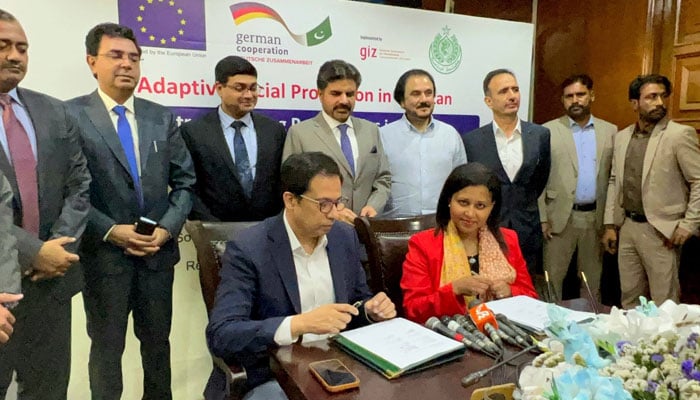GIZ and Sindh sign agreement for social protection of vulnerable communities
In a step towards building a resilient, inclusive and climate-adaptive social protection system in Pakistan, the Sindh government and GIZ Pakistan, with support from the European Union (EU) and Germany’s Federal Ministry for Economic Cooperation and Development (BMZ), have signed an implementation agreement.
The signing ceremony was held on Tuesday at an event headed by Sindh Planning and Development Minister Syed Nasir Hussain Shah and Planning and Development Board Chairman Najam Ahmad Shah.
The event brought together key stakeholders. Speaking on the occasion, Johanna Knoess, head of adaptive social protection at the GIZ Pakistan, highlighted the importance of sustained collaboration and reaffirmed the joint commitment to advancing systemic reform through data integration, policy innovation and institutional coordination.
The agreement was signed by representatives from the Sindh Planning and Development Board, social protection department, Social Protection Authority, Provincial Disaster Management Authority, rehabilitation department and GIZ Pakistan.
The agreement reinforced in the agreement a shared vision to strengthen social protection systems through coordinated policymaking, institutional partnerships and integrated programming. Outlining the key pillars of the Adaptive Social Protection Project, Knoess emphasised the need for a holistic approach. She identified five critical areas of collaboration — policy, institutions and partnerships for social protection, programme delivery, data integration, and climate change adaptation for livelihood resilience.
She stressed that these pillars were essential for ensuring a comprehensive evidence-based approach to social protection. She noted that the agreement along with subsequent letters of understanding and joint work plans must translate into tangible real-world impact — leading to meaningful improvements in the lives of vulnerable communities.
The planning minister expressed gratitude for continued support from the EU and BMZ through the GIZ. He reiterated the province’s commitment to adaptive social protection as a central strategy for reducing vulnerabilities and enhancing crisis response.
He said the project would contribute significantly to building a stronger and more inclusive social protection system for the future.
-
 'Prince Harry Sees A Lot Of Himself In Brooklyn Beckham'
'Prince Harry Sees A Lot Of Himself In Brooklyn Beckham' -
 Kate Middleton’s Cancer Journey Strengthens Her Commitment To Helping Children
Kate Middleton’s Cancer Journey Strengthens Her Commitment To Helping Children -
 Gaten Matarazzo Compares 'Stranger Things' Ending To 'Lord Of The Rings'
Gaten Matarazzo Compares 'Stranger Things' Ending To 'Lord Of The Rings' -
 Prince Harry Slams Publisher Over 'dirty Trick' Ahead Of Showing Evidence
Prince Harry Slams Publisher Over 'dirty Trick' Ahead Of Showing Evidence -
 Blueface Promises To Change Behaviour If His Ex Comes Back
Blueface Promises To Change Behaviour If His Ex Comes Back -
 Prince Harry Makes Crucial Promise To Meghan Markle Over UK Return
Prince Harry Makes Crucial Promise To Meghan Markle Over UK Return -
 Keir Starmer’s China Visit: UK Follows Mark Carney In Major Reset Of Ties
Keir Starmer’s China Visit: UK Follows Mark Carney In Major Reset Of Ties -
 NASA Celebrates One Year Of Trump’s Second Term With Moon And Mars Achievements
NASA Celebrates One Year Of Trump’s Second Term With Moon And Mars Achievements -
 Chris Pratt Shares Real Thoughts On AI In Film Industry
Chris Pratt Shares Real Thoughts On AI In Film Industry -
 Netflix Disappointed As Meghan Markle’s Series Struggles To Impress
Netflix Disappointed As Meghan Markle’s Series Struggles To Impress -
 Royal Family Announces Death Of Princess: King Releases Statement
Royal Family Announces Death Of Princess: King Releases Statement -
 Sarah Ferguson Will Continue To Be Part Of Andrew's Life
Sarah Ferguson Will Continue To Be Part Of Andrew's Life -
 Google’s Gemini Now Offers Free SAT Prep With Full-length Mock Tests
Google’s Gemini Now Offers Free SAT Prep With Full-length Mock Tests -
 Everything You Need To Know About Macron’s Viral Glasses: Cost, Model, All Details Revealed
Everything You Need To Know About Macron’s Viral Glasses: Cost, Model, All Details Revealed -
 Elon Musk Warns Of AI ‘supersonic Tsunami’: What It Means For Future
Elon Musk Warns Of AI ‘supersonic Tsunami’: What It Means For Future -
 Why Victoria Beckham's Dance Video From Brooklyn's Wedding Won't Be Released
Why Victoria Beckham's Dance Video From Brooklyn's Wedding Won't Be Released




